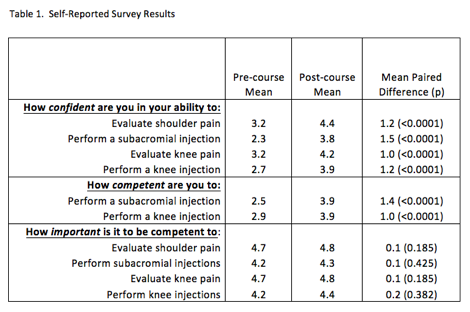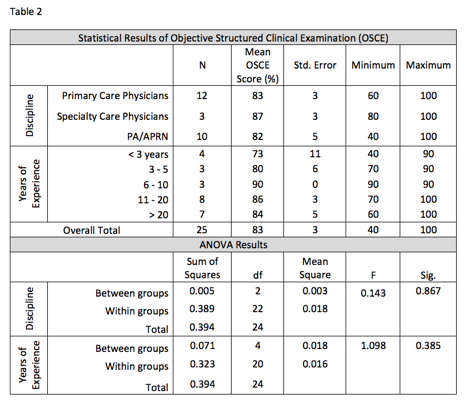Session Information
Date: Monday, November 14, 2016
Title: Education - Poster
Session Type: ACR Poster Session B
Session Time: 9:00AM-11:00AM
Background/Purpose: In response to the Veterans Access, Choice, and Accountability Act of 2014, the Veterans Health Affairs (VHA) Simulation Learning, Education and Research Network (SimLEARN) National Simulation Center launched the Musculoskeletal (MSK) Master Educator program. This initiative aims to improve veteransÕ access to appropriate care by strengthening training in the evaluation and management of common MSK conditions. This report describes the first year of the SimLEARN MSK Master Educator program.
Methods: The 2-day course was held at the SimLEARN facility in Orlando, and focused on evaluation and management of shoulder and knee pain in primary care. Opportunity to attend was communicated through national, regional, and local VHA organizational networks. Curriculum was introduced through didactics, reinforced in small-group hands-on sessions enhanced by peer-teaching and simulation via standardized patients and joint injection task-trainers. Pre- and post-course self-assessments were collected, using a 5-point response scale. Competence was assessed using a previously validated objective structured clinical examination (OSCE). Finally, participants rotated through an observed structured teaching experience (OSTE), where they practiced roles of simulated patients, evaluators and learners. Data were analyzed using SPSS.
Results: Twenty-five participants completed the program in 2016 (15 physicians, 7 nurse practitioners (APRN), 2 physician assistants (PA), 1 nurse). Participants consistently gave high ratings to the importance of competence in the evaluation and management of MSK conditions, and self-reported competence ratings were significantly higher after the course (Table 1). Mean OSCE score was 83% (SEM = 3); statistical description of OSCE scores is reported in Table 2. There were no significant differences in OSCE score across disciplines or years of experience.
Conclusion: The SimLEARN MSK Master Educator course is a new professional development workshop for clinical educators, providing content instruction, external assessment of competence, a portable curriculum, and structured practice teaching and evaluating peer learners in an OSTE. Participants from a broad range of disciplines and experience levels reported significant increases in confidence and competence in evaluating and managing MSK problems. Next steps will involve dissemination of this opportunity to leaders in medical and health professions education, and implementation of adaptations of the training program at educatorsÕ local institutions. 
To cite this abstract in AMA style:
Barker AM, Okuda Y, Bruno P, Peplinski B, Artino A, La-Rochelle J, Cannon GW, Battistone MJ. The Musculoskeletal Master Educator Training Program: A New Resource and Professional Development Opportunity for Leaders in Medical Education [abstract]. Arthritis Rheumatol. 2016; 68 (suppl 10). https://acrabstracts.org/abstract/the-musculoskeletal-master-educator-training-program-a-new-resource-and-professional-development-opportunity-for-leaders-in-medical-education/. Accessed .« Back to 2016 ACR/ARHP Annual Meeting
ACR Meeting Abstracts - https://acrabstracts.org/abstract/the-musculoskeletal-master-educator-training-program-a-new-resource-and-professional-development-opportunity-for-leaders-in-medical-education/

